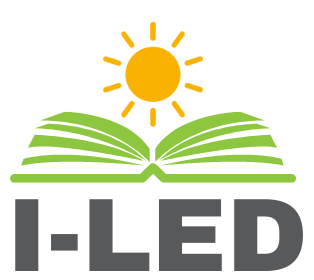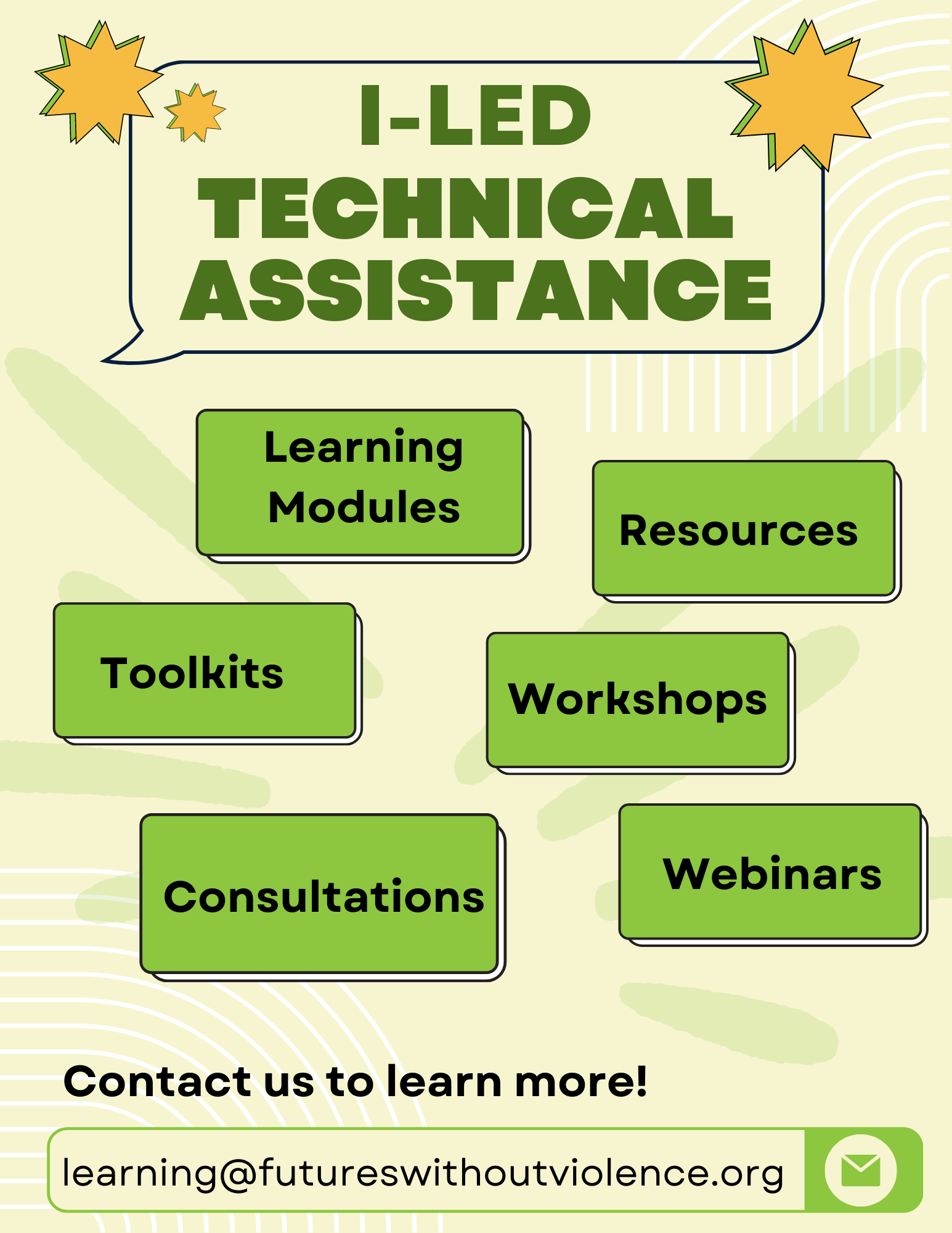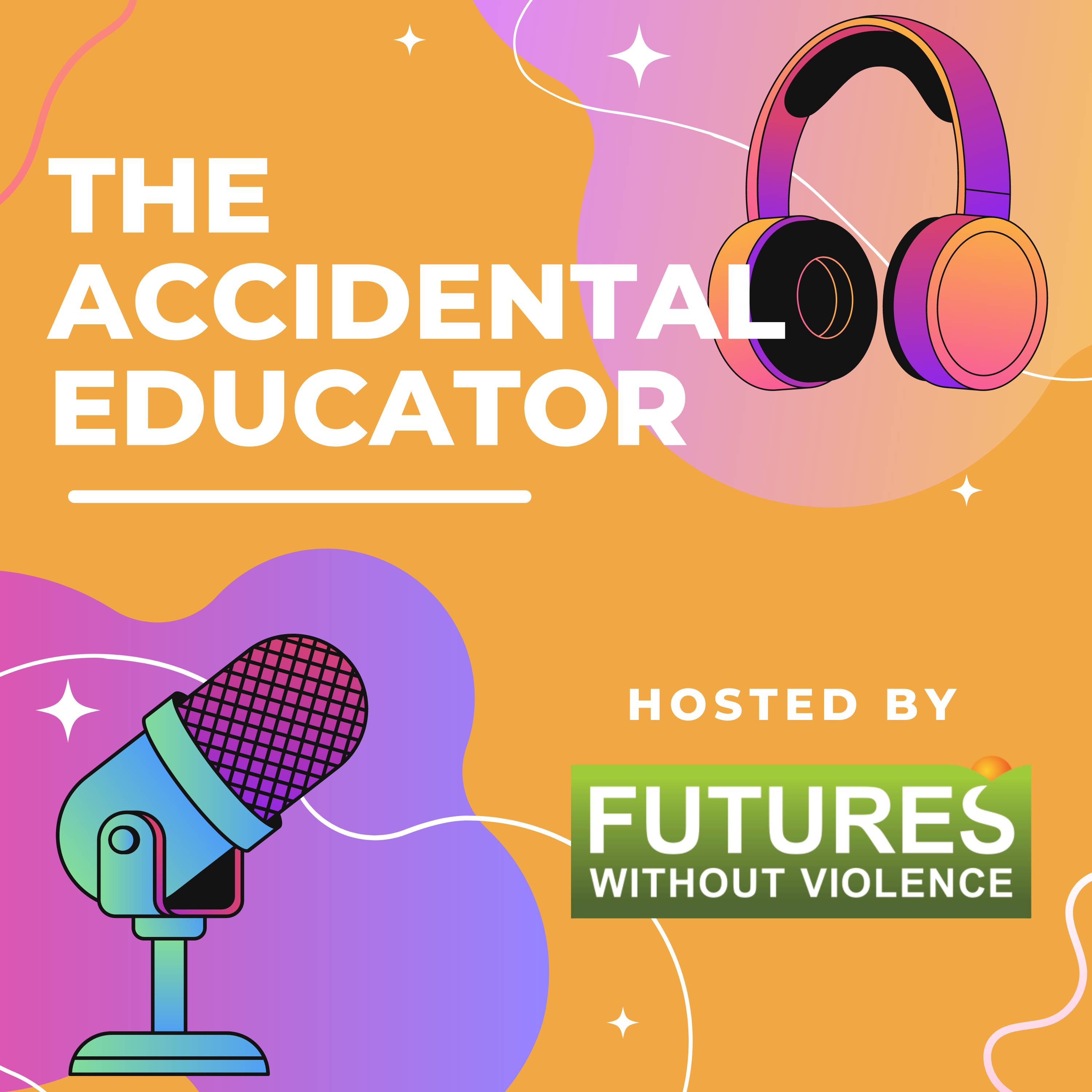Institute for Leadership in Education Development
 The Institute for Leadership in Education Development (I-LED) offers hands-on workshops and technical assistance to help US Department of Justice Office on Violence Against Women (OVW) grantees to enhance the relevance and effectiveness of training and education programs supported by OVW, and improve the capacity of OVW grantees to design and deliver well-organized, accessible, highly-interactive training and education for their constituents.
The Institute for Leadership in Education Development (I-LED) offers hands-on workshops and technical assistance to help US Department of Justice Office on Violence Against Women (OVW) grantees to enhance the relevance and effectiveness of training and education programs supported by OVW, and improve the capacity of OVW grantees to design and deliver well-organized, accessible, highly-interactive training and education for their constituents.
I-LED workshops reach national, multidisciplinary audiences of OVW grantees and their constituents, including advocates, attorneys, social workers, visitation center staff, volunteer coordinators, judges, and other professionals who engage in program design and/or faculty service.
Principles of Adult Learning
I-LED programs are all designed based on the following principles of experiential adult learning:
- Learning is a continuous process and not just a final outcome.
- All learning involves building upon previous knowledge.
- Conflict, differences, and disagreement are catalysts for learning.
- Learning requires the integration of thinking, feeling, perceiving, and behaving.
- Learning involves incorporating new experiences into existing understanding and adjusting existing understanding based on new experiences.
According to this approach, knowledge is not simply transmitted from the instructor to the learner in a one-way fashion, as is often the case in traditional education. Instead, knowledge is actively created and recreated within the learner’s personal understanding.
I-LED Training Topics
- Effective Program and Curriculum Development (EPCD) Workshop (2.5 days in-person and offered virtually over 8 weeks).
This workshop focuses on the detailed process of designing a program and creating a training or curriculum outline. The next virtual EPCD course will be offered in 2024 - Faculty Development Workshop (2.5 days in-person and custom abbreviated virtual options are available).
This workshop engages participants in the process of planning an educational program with an emphasis on learning how to facilitate effectively. The next in-person faculty development workshop is coming March 2024! - Effective Facilitation Skills Workshop (2 days in-person and custom virtual options).
This workshop focuses on effective skills to prepare for and facilitate small and large meetings. - Distance eLearning Course (offered virtually over seven weeks). This workshop focuses on assisting grantees to design and deliver interactive virtual educational offerings on a budget.
Technical Assistance
Please reach out to learning@futureswithoutviolence.org to request technical assistance and/or for more information about our upcoming trainings and TA.

Online Learning Modules
- Adult Learning Toolkit (updated version coming early 2024!)
- Language Access and Language Justice Learning Module
Podcast (NEW!)

The Accidental Educator (available on most podcast streaming platforms!)
The Accidental Educator is a podcast for advocates who want to change how we teach about gender-based violence. We invite you to experience our “How to Make a Podcast” podcast. In our first two episodes we follow our host, Abby, as she learns how to get started with pre-production and planning out the theme and content, what gear she needs, how to use audio editing platforms, and how to edit the episode into a cohesive story. We also talk with local domestic and sexual violence programs about their podcasting strategies and how they make their podcasts relevant to the communities they serve. Make sure to check out the episode’s accompanying resource guide to learn more about podcast production. In episodes 3 & 4, Abby talks with Meghna Bhat, a survivor storyteller, first generation immigrant, and gender and social justice educator. Together, Abby and Meghna dive deeper into how you can use trauma-informed storytelling in your podcast.
Online Tools
The Accidental Educator Toolkit
Part One: Adapting Facilitation Skills from In-Person to Virtual
This tool offers virtual alternatives for common in-person activities, engagement strategies, and facilitation techniques.
Part Two: Dealing with Virtual Facilitation Challenges
This tool provides tech solutions, facilitation strategies, and content suggestions to support facilitators, or “accidental educators,” adapting to individual participant and overall group dynamic related challenges in an online format.
Eleven Steps for Designing a Multilingual Accessible Education Program
This tool gives a step-by-step guide for implementing greater language access into both in-person and virtual training events through the lens of language justice. The content is in English and Spanish.
Learning & Leadership Department Education and Training: Development and Delivery Process
This tool denotes some indicators of quality to consider when reviewing training or education materials.
Translating Your In-Person Education Online: Tips for Piecing it All Together
This tool incorporates the principles of adult learning into virtual education delivery and considerations on delivering an in-person course through e-learning.
Translating Face-to-Face to Virtual Tip Sheet
This tool provides some great tips on how to adapt traditional practices of face-to-face instruction to virtual environments.
Facilitating Support Groups Online
This tool provides resources on how to move traditional support groups online, in addition to some traditional support group resources and topics for online support groups.
This tool provides ten (10) key tech tips that can help you enhance your web-based offerings.
This page has infographics that engage andragogy and engaging in a digital space.
Webinar Series:
Learning Through Interactivity
Webinar 1: Learning Through Interactivity: Creating Curiosity through Learning Activities
Webinar 2: Learning Through Interactivity: Creating Meaningful and Accessible Interactivity
Webinar 3: Learning Through Interactivity: How to Tell a Story, Part 1
Webinar 4: Learning Through Interactivity: How to Tell a Story, Part 2
Leading Educational Support Groups Webinar Series / Impartición de grupos de apoyo educativo
This project was supported by Grant No. 15JOVW-22-GK-03994-MUMU awarded by the Office on Violence Against Women, U.S. Department of Justice. The opinions, findings, conclusions, and recommendations expressed in this document are those of the author(s) and do not necessarily reflect the views of the Department of Justice, Office on Violence Against Women.


